Graeme McBride doesn’t expect he will ever know the exact circumstances around his only sister’s death.
Maureen McBride, a feminist reformist nun, who headed an international missionary order and had worked with some of the most notorious prisoners in the US, died in a car accident in France on November 29. Police reports said the 63-year-old Kiwi had suffered “a medical event” before the crash.
Speaking exclusively to the Weekly, Maureen’s youngest brother Graeme (58) says the news of her death came in the early hours of the morning, leaving the family devastated.
“Our older brother Peter rang me – he had been phoned about 3.30am with the news. It was just surreal, really. I guess sudden death always is, but it was just so unexpected.”

Sister Maureen McBride 1953 – 2016
Maureen, who dedicated her life to championing justice and peace through her work with the Sisters of Our Lady of the Missions (RNDM), had been attending an international gathering at St Rambert, where the nuns have a retreat, and had just dropped another Sister off at Lyon Airport prior to the accident.
Because there was no autopsy, the events surrounding the accident would remain a mystery, Graeme says, going on to explain that his sister’s sudden death wasn’t the first to hit the close-knit family.
Two older brothers, John, who was 49 at the time, and Gary also died much too young. Gary’s death at 34 was assumed to have been from a heart attack.
“We can only guess it was the same with Maureen.”
Graeme remembers his sister as a humble but fearless woman. She was ahead of her time, preferring to wear “civvies” rather than a habit, and advocating for women’s rights in an era where women in leadership roles were still something of a novelty and a rarity.
Maureen’s brother Graeme (left) and cousin Chris.
One of five siblings, eldest brother Peter (73) still lives in their home city of Nelson – she was, Graeme says, always very studious but also “lots of fun”.
Maureen attended St Joseph’s School and Sacred Heart Convent before going to Nelson Girls’ College for her final year. Gabriel King-Turner, a former St Joseph’s pupil, remembers Maureen being heroic during the annual school picnic by the Maitai River.
“She probably saved my life. I had got in too deep, inhaled some water and there was no-one else who saw me… She hauled me out. No teacher approached, so in her humble, gentle way, it all went under the radar.”
Becoming a nun in 1976, Maureen went on to gain a Master of Arts in Languages and Literature, and was the first sister to attend Christchurch Teachers’ Training College. She taught at Lower Hutt’s Sacred Heart Girls’ High School before travelling to New York in 1986 to study liberation and feminist theology at the Maryknoll School of Theology.
Less than two years later, the young sister from Nelson was again making a splash, not in a river this time, but for her work counselling prisoners dying of Aids – the so-called “untouchables” – at New York’s notorious Sing Sing Prison.
In an article published in the Weekly in June 1988, she criticised the prison’s hands-off approach to Aids inmates and its isolation of dying prisoners.
“The greatest suffering is to be sick alone,” she said then. “It’s an experience of total abandonment being apart from the care and support of fellow prisoners.”
Cousin Chris McBride, who visited Sing Sing with Maureen, recalls the “absolute peace she gave them when she walked into the room. It was quite incredible. I admired Maureen intensely for the work she was doing. She was involved in trying to get more visits for the prisoners and setting up a hospice for them”.
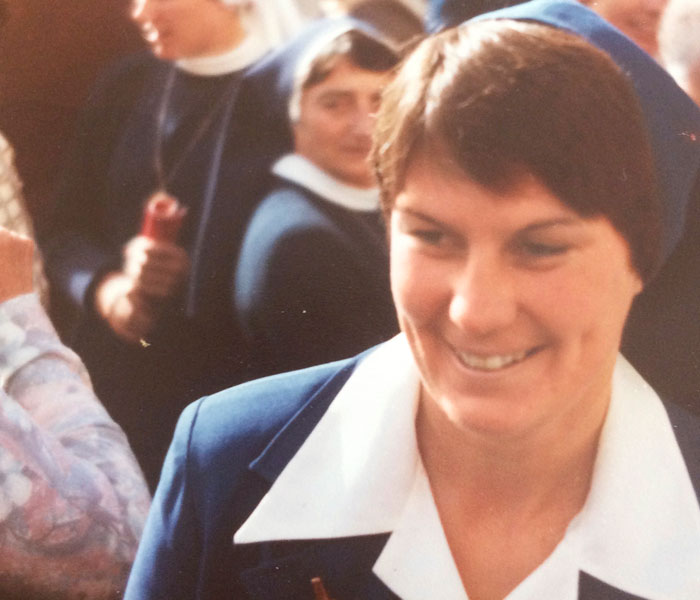
Maureen later spent time in Senegal and the Philippines, where she taught at Cotabato’s Notre Dame University – a facility that functioned with only the bare essentials and with a strong Muslim presence among the student population – and in Rome.
She was congregational leader of the RNDM for 12 years, initiating a rewriting of the constitution and spear-heading the opening of new missions in places such as Kazakhstan and South Sudan.
Describing her as “not your typical missionary”, Chris says Maureen worked tirelessly for the liberation of the oppressed.
“She was someone who gave total respect to all beliefs. She wasn’t about trying to convert people – it was about their ability to house and feed themselves.
“She was a remarkable woman who was basically changing the face and the faith of what Catholicism was about.
“She was radicalised by her experiences in the best sense, in terms of the pursuit of fairness and justice. She protested [during the 1981 Springbok tour], she agitated and she was a protector of the rights of people.”
Clare Murphy, a close friend echoed that, noting that Maureen’s 10 years in the Philippines highlighted her commitment to women’s issues and rights, which “didn’t endear her to everyone”.
Her brother Peter said a requirement of the order is that nuns are buried where they die, which is why she was buried in France.
“And here’s an interesting analogy – the first Catholic priest to come to New Zealand in 1850 was Antoine Garin from St Rambert, who is buried in Nelson; Maureen, from Nelson is now buried in St Rambert.”
Words: Julie Jacobsen
For more from New Zealand Woman’s Weekly, visit our Facebook page, follow us on Instagram, and sign up to our newsletter.
